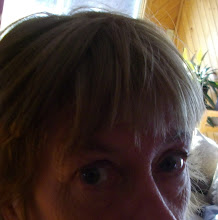Everybody wants to believe that their parents - and even on some level, more importantly, themselves - are going to be perfectly healthy, climbing the Himalayas one day and dead the next ~ Jane Gross.
~~~~
A lot of us think we have come to terms with the inescapable fact of our own death and the death of those close to us. But what I think we fail to accept, indeed often vehemently deny, is that there will most likely be another stage of life in between fine and dead. And that stage will probably be much longer than we imagine.
~~~~
In another excellent On Being broadcast entitled The Far Shore of Aging, Krista Tippett speaks with Jane Gross, journalist and founder of the New York Times' New Old Age blog. In this conversation Jane shares her experience of caring for her mother, who, "...was fine and then all of a sudden in a hundred small ways, none of which were going to kill her, not fine."
...you have no idea how long it's going to last. You have no idea what's going to happen next and I think, for so many of us, and, you know, this obviously is an upper-middle- class thing to say in a certain way, but we're mostly people who have been enormously successful in our professional lives and are used to feeling in control of what we're doing. You know, you make a to-do list and you check everything off the to-do list and then, when you get to the bottom of the page, whatever your task is, you're done. This doesn't work that way.This piece really tore my heart open because Jane's story so closely parallels my experience with my own mother's decline, and she speaks directly and honestly about the raw emotions that permeate that in-between time - the denial, the overwhelm, the helplessness, the guilt and the exhaustion. And the other, softer feelings that are unexpectedly awakened...
It takes a while to learn that some decisions are far more important than others; some things are actually in your hands and some not. What is vital, and well within your control, is being present in a consoling way and respectful enough to bear witness to the inevitable. This, too, is about slowing down. At first it's hard to walk at a snail's pace beside your mother or father when they can no longer keep up, at least without impatiently rolling your eyes. Or to kneel at their level when they're in a wheelchair. But the pace and the vantage become more natural and annoyance softens into tenderness if you let it.For me it was a time of great sadness and yet also a time of great tenderness and healing. As with Jane, my relationship with my mother was strained for most of our life together - again like Jane, my father (my source of unconditional love) died young. Being forced into the role of my mother's caregiver put me right up against all the wounds and resentments that I had been carrying around for 50+ years but which I was no longer able to cling to as I watched this person, who to me had always been larger than life, slowly fade away before my eyes. And as layer upon layer of who I thought my mother was fell away, I began to glimpse a beautiful, radiant being underneath, until I could finally see my mother as a person in her own right, not just who she was in relation to me. It remains a great sadness, though less of a burden of guilt, that it took me so long to wake up to that. I can't really say that there was complete resolution. There has certainly been acceptance and forgiveness, although in those moments that I most strongly feel my mother's presence in my heart, through the tears I still tell her I'm sorry.
If there's any advantage at all to them having this long slow dying, there's a lot of time to get things right that you didn't get right earlier. I mean, it definitely changed the architecture of my family. It definitely changed what the nature of my memories of my mother are and I imagine will be forever. I mean, on the one hand, it makes me more scared and, on the other hand, it makes me less scared.Access the full program (podcast or transcript) HERE.
I learned what I was made of; I found my better self. I found my mother. I found my brother. But all of that came later.
~~~~
I have seen in you what courage can be when there's no hope.
~ May Sarton - As We Are Now
~~~~

